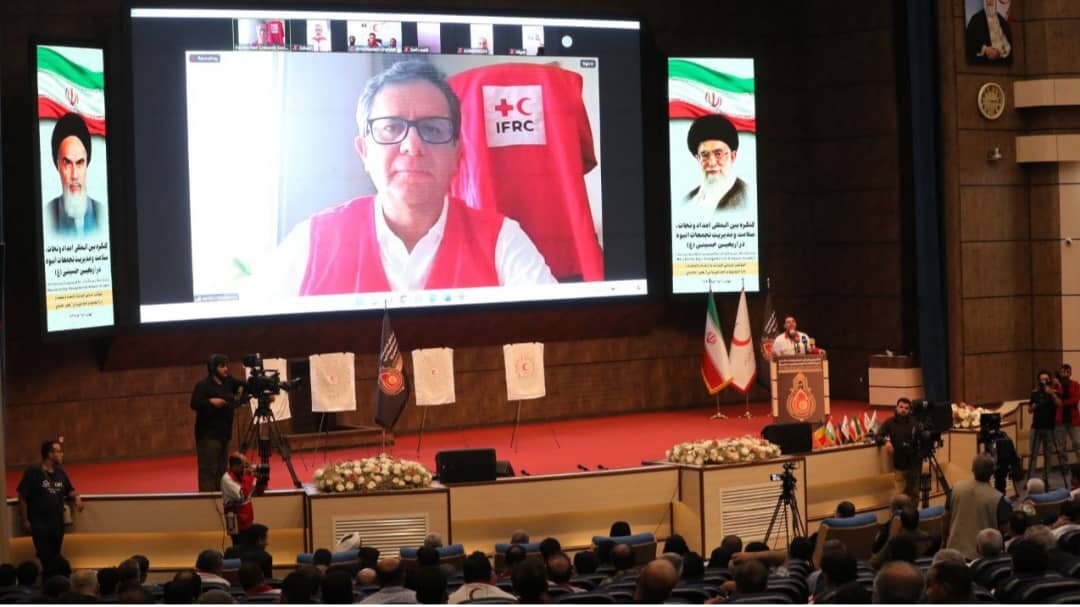Arbaeen Intl. Congress offers a unique model of mass gathering management: IFRC official

TEHRAN – Xavier Castellanos Mosquera, the International Federation of Red Cross and Red Crescent (IFRC) undersecretary-general for national society development and operations coordination, has said that Arbaeen International Congress offers a unique model of mass gathering management for other red crescent societies worldwide.
“The management of mass gatherings demonstrates exceptional expertise and the Iranian Red Crescent Society is a pioneer in sharing its knowledge and experience in this international congress,” Castellanos Mosquera highlighted.
He made the remarks at the inauguration ceremony of ‘the International Congress of Relief and Rescue, Health and Mass Gatherings Management in Arbaeen’ which was held in Tehran on August 1.
The Arbaeen pilgrimage, which is one of the largest religious gatherings in the world, comes 40 days after Ashura, the martyrdom anniversary of Imam Hussein (AS), the third Imam of Shia Muslims, and the grandson of Prophet Muhammad (PBUH).
While attending the congress via video conference, the IFRC official lauded the IRCS leadership for conducting the congress and assured that the IRCS efforts would contribute to the prosperity and comfort of Arbaeen pilgrims, Mehr news agency reported.
The experience gained over many years of managing mass gatherings in different domestic and global events such as the Hajj pilgrimage in Saudi Arabia and the Arbaeen pilgrimage in Iraq have enabled the IRCS to carefully plan and master various aspects of events such as preventive health care, security and crowd control, emergency preparedness, and medical services, he added.
Castellanos Mosquera went on to enumerate four basic points to ensure the success of mass gathering management.
First, safety and security: It includes preparedness to respond to accidents and hazards’ risks, medical emergencies, diseases, and even acts of violence. Each of them requires particular planning and procedures tailored to the location of the event.
Second, the environmental footprint: mass gatherings face the challenge of waste accumulation. Therefore, waste management and recycling should be an integral part of the planning. Reducing plastic consumption, saving energy, and finding alternative solutions should be on the agenda.
Third, crowds induce great risks. So, it is critical to minimize inappropriate behaviors by providing clear and timely information and guidelines to participants before the event commences. It helps to ensure that participants understand all the issues and challenges and are well-prepared knowing how to act properly and deal with different situations.
Observing rules and regulations is also important in ensuring safety.
Fourth, coordination: it is vital to be achieved by learning from past experiences and cooperating with relevant partners before starting the event.
During the event, be aware of each other's roles and responsibilities, who does what, where, and how, and do not fail to communicate at any moment.
Finally, as the event ends discuss the lessons learned from the event and prepare a report of the learnings.
The IRCS hosted the International Congress on Relief and Rescue, Health, and Mass Gatherings in Arbaeen in Tehran from August 1-2.
Relief and rescue in Arbaeen; hygiene, treatment, and health; training, research, and technology; mass gatherings; passive defense; and public participation were the topics of the conference, the IRCS website reported.
Each year, a huge crowd of people flocks to Karbala, where the holy shrine of Imam Hussein (AS) is located, to perform mourning rituals.
This year Arbaeen falls on August 25. Some five million Iranian pilgrims are estimated to attend the Arbaeen trek.
Also, the 4th International Congress on “Health in Arbaeen” was held in Tehran from July 3 to 5.
A total of 3,500 national and international participants attended the 4th congress. Hosting the event, the Iraqis comprised the majority of foreign attendees to enhance services to pilgrims.
The congress focused on the following scientific areas including accidents and hazards; artificial intelligence; traditional medicine; processions; environmental health; nursing; relief and rescue.
It also covered rehabilitation; forensic medicine; mental health; nutrition; cultural issues; pharmaceuticals; medical tools; as well as mawkibs (voluntary stations to serve the pilgrims). Moreover, some new topics such as dentistry and oral hygiene were discussed.
MT/MG
Leave a Comment